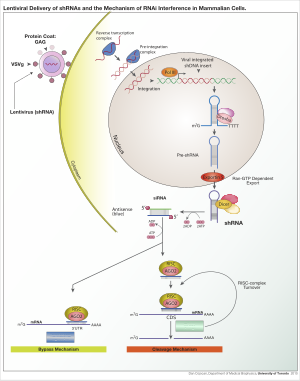
A short hairpin RNA or small hairpin RNA (shRNA/Hairpin Vector) is an artificial RNA molecule with a tight hairpin turn that can be used to silence target gene expression via RNA interference (RNAi).[1][2] Expression of shRNA in cells is typically accomplished by delivery of plasmids or through viral or bacterial vectors. shRNA is an advantageous mediator of RNAi in that it has a relatively low rate of degradation and turnover. However, it requires use of an expression vector, which has the potential to cause side effects in medicinal applications.[3]
The promoter choice is essential to achieve robust shRNA expression. At first, polymerase III promoters such as U6 and H1 were used; however, these promoters lack spatial and temporal control.[3] As such, there has been a shift to using polymerase II promoters, which are inducible, to regulate shRNA expression.
- ^ Paddison PJ, Caudy AA, Bernstein E, Hannon GJ, Conklin DS (April 2002). "Short hairpin RNAs (shRNAs) induce sequence-specific silencing in mammalian cells". Genes & Development. 16 (8): 948–58. doi:10.1101/gad.981002. PMC 152352. PMID 11959843.
- ^ Brummelkamp TR, Bernards R, Agami R (April 2002). "A system for stable expression of short interfering RNAs in mammalian cells". Science. 296 (5567): 550–3. Bibcode:2002Sci...296..550B. doi:10.1126/science.1068999. hdl:1874/15573. PMID 11910072.
- ^ a b Wang Z, Rao DD, Senzer N, Nemunaitis J (December 2011). "RNA interference and cancer therapy". Pharmaceutical Research. 28 (12): 2983–95. doi:10.1007/s11095-011-0604-5. PMID 22009588. S2CID 36738846.